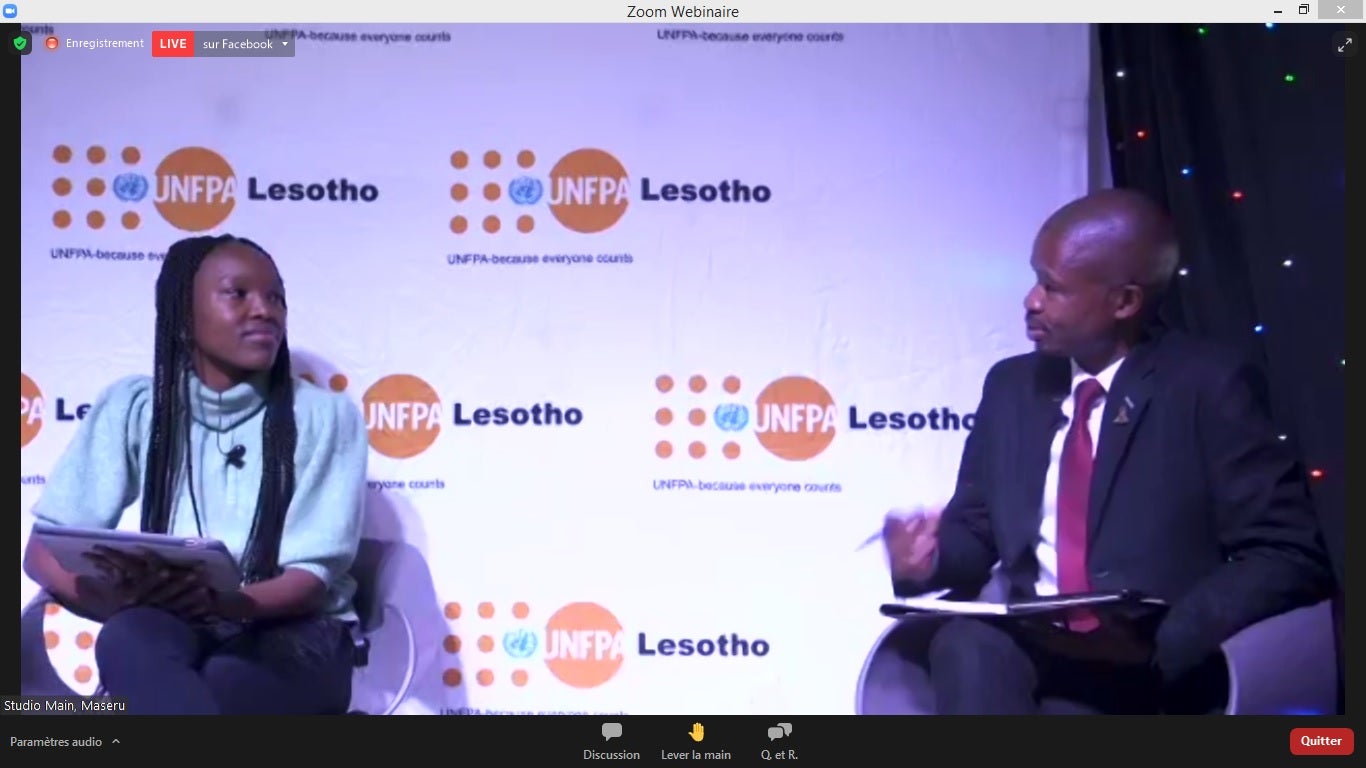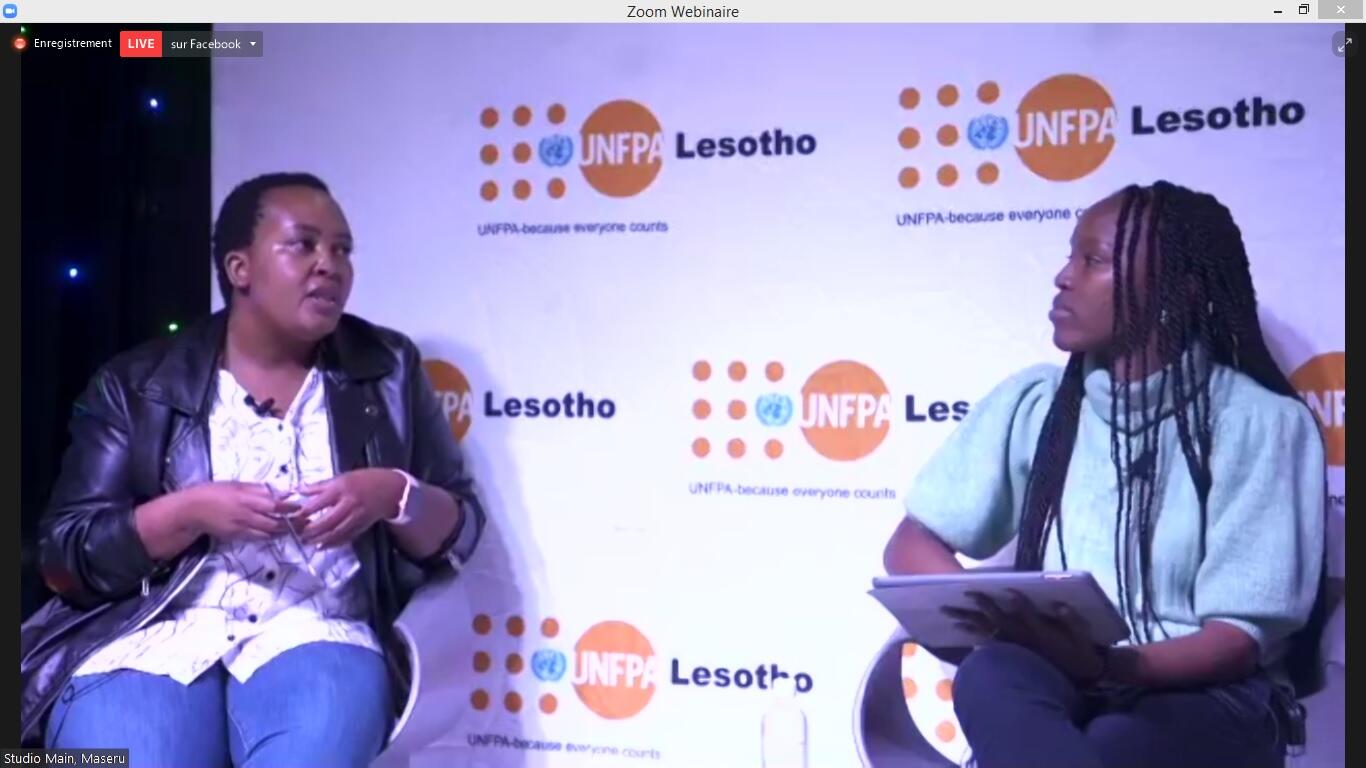The need to start teaching consent and bodily autonomy to children and to amend laws that infringe the welfare of others were at the heart of the discussions when UNFPA, the United Nations Population Fund launched the 2021 State of the World Population Report in Lesotho.
Speaking during the virtual launch, an acclaimed Lesotho author Lineo Matlakala said, “We must stop hiding behind culture and religion and continue to hold dialogues (on self-determination until consent and bodily autonomy become a basic norm. We need to create an environment where everyone can openly say, ‘My Body is My Own.’
The report, titled My Body is My Own, was launched through an online event with Poetry, Music and exchange of ideas. In the dialogue on Bodily Autonomy, young people expressed their personal experiences on different aspects of decision making in their lives and their understanding of “Bodily Autonomy.” They shared the reality of the barriers that exist on decision making for young girls today in their daily lives but also the many initiatives that exist to empower women to address the negative impacts of these barriers.
Matlakala highlighted that bodily autonomy can mean different things to different people, adding, “We can agree that it is the freedom to be you, in your own body. It is the joy of not being violated emotionally or physically. It is respect and dignity.”
She stated that in Lesotho, the story is different. A woman’s body belongs to her husband, her children, her parents, the church, the taxi driver, her boss and her ancestors as well. “From the moment she is born, a girl is being prepared to surrender and submit herself, her body and soul to church and to her husband, what is left to herself is the air she breathes.”
She continued, “In primary school, she cannot even speak out about a certain boy twisting her arm or her teacher licking his lips lustfully when he looks at her. He asks about her growing breasts and curves and at only 13, he already tells her she is his wife.”
“As a sexually active teenager, she cannot even openly go to the clinic and ask for contraceptives without getting a mouthful followed by bible verses about how ill-mannered she is or how much of a disappointment she is. Her decision not to have children at that age is used against her.”
The UNFPA Representative to Lesotho Dr Marc Derveeuw reaffirmed UNFPA’s commitment to deal with the many issues mentioned in the report by availing resources and technical assistance and join hands with the government and other partners and find an appropriate response for action.
The Representative expressed particular concerns on the situation for Lesotho, highlighting that child marriage is still taking place in Lesotho while it is considered illegal. Rape, sexual violence and domestic violence is often unpunished, he said, even if there is a legislation in place. Rape is used as a weapon, to punish women, young girls and even children. In Lesotho women and young girls have to rely on transitional sex to survive, to have food, to have an education and to have protection.
On Maternal Mortality, he pointed out that in Lesotho Maternal Mortality is the highest in Southern Africa and the risk of dying in childbirth is higher than many of the countries in civil strife, war or conflict.

Social and religious norms are often a bottleneck. In Lesotho 40 percent of the health centres still do not provide contraception preventing women to make a choice on when to have children or decide on the number of children in their family.
He added that recent analysis of health statistics from 2020 reveals that the complications of unwanted pregnancies and illegal abortions are the major cause of the mortality of young adolescent women. These deaths could have been prevented and are the direct result of a denial of bodily autonomy and the ability for self-determination. He stressed that the situation is exacerbated by COVID19 and women are not given the opportunity to choose.
Dr Derveeuw welcomed the contribution of all and valued the opinions expressed in the debate, in the chatbox, online and in Facebook. “This event is so rich and we cannot discuss all what has been stated today. UNFPA will therefore be organising a youth forum in the near future to give much more opportunity to young people to express themselves.”
On his part, the Minister of Development Planning who received the report on behalf of the Government of the Kingdom of Lesotho said the government respects bodily autonomy and strives to achieve Sexual and Reproductive Health and Rights for all through education, laws and policies that have been made. He said this is apparent as the government has achieved numerous strides on bodily autonomy since the 1994 Cairo summit.
“The government has institutionalised Comprehensive Sexuality Education at all levels and has made it a compulsory and examinable subject,” he stated, adding that if women and girls are educated, they are likely to make their own decisions about contraception and health care.
He further noted that the government has made numerous policies and laws that support the right to bodily autonomy, citing the Sexual Offences Act of 2003, the Legal Capacity of Married Persons Act, 2006, Compulsory Education Act of 2010 and the Penal Code Act, 2010.
“These laws are meant to support women’s rights to have their own choice over their bodies without violence or force,” he emphasised.
The event was graced with songs and poetry. More than 100 people including Members of Parliament joined the virtual launch while more than 700 others including young people participated through facebook, where the event was broadcast live.


